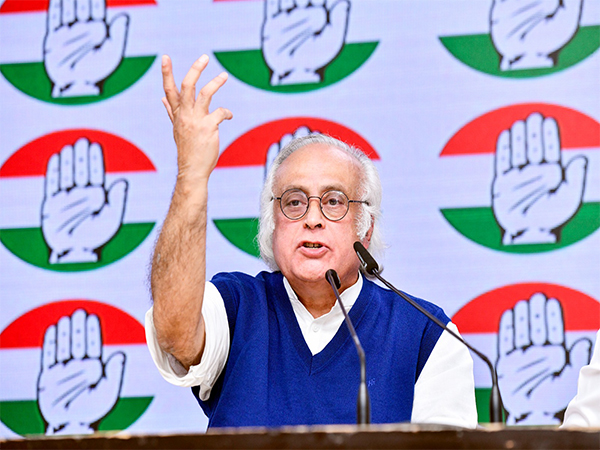Delhi HC upholds family court judgment, denies divorce to former J-K CM Omar Abdullah
Dec 13, 2023

New Delhi [India], December 13 : The Delhi High Court on Tuesday dismissed the appeal moved by former Jammu and Kashmir Chief Minister Omar Abdullah against the Family Court judgment and upheld the judgment denying him a divorce from his wife Payal Abdullah.
Justices Sanjeev Sachdeva and Vikas Mahajan said, "We find no infirmity in the view taken by the Family Court that the allegations of cruelty were vague and unacceptable and that the appellant failed to prove any act which could be termed an act of cruelty, whether physical or mental, towards him."
The high court said in the judgment uploaded on Wednesday that the Family Court had held that the allegation of tutoring children had not been established.
The appellant had access to his children and had been meeting them and spending time with them. Even this allegation has not been established by the appellant.
The high court referred to a letter dated June 27, 2016, in which the respondent is alleged to be complaining to the Prime Minister about him deserting her, filing for divorce and her being harassed in several ways, including arrest warrants being issued from his constituency.
In the interview, the respondent is alleged to be complaining about the appellant not paying any maintenance, having been evicted from her house for the education of children, and filing a claim before a court of law.
"Even if one were to examine the documents and accept them at their face value, in our view, the same still does not meet the threshold of cruelty as required for a grant of divorce under the Special Marriage Act," the high court said in the judgment.
Omar Abdullah challenged the judgment and decree dated August 30, 2016, passed by the Family Court, whereby the petition filed by him seeking divorce under Section 18 of the Foreign Marriage Act 1969, read with Section 27(1)(B) and (D) of the Special Marriage Act, 1954, on the grounds of desertion and cruelty was dismissed.
The appellant got married to Payal Abdullah, a Hindu, on September 1, 1994, under Civil Law in England.
The appellant filed the petition, alleging that their marriage has irretrievably broken down and that the parties have been living separately since 2009, although they had not enjoyed conjugal relations since 2007.
As per the appellant, the respondent refused to accompany him to Kashmir in 2002, when he moved there to prepare himself for the elections and this resulted in the petitioner having to fly to Delhi on the weekends to meet his children.
It was alleged that the respondent alienated the children from the appellant, which is evident from the SMS exchange between them and the appellant.
He further alleged that the Respondent had an uncomfortable relationship with the appellant's family, due to which he was forced to distance himself from his own family to keep the peace in his marriage.
It was contended that the respondent would never attend holidays with the appellant's family, nor would she allow the children to do so.
On the other hand, Respondent Payal Abdullah contended that the petition does not disclose any cruelty and as such, the petition is liable to be dismissed for want of cause of action.
The allegation of parties not having any conjugal relations since 2007 was denied; it was submitted that the parties were residing together until the filing of the petition in January 2013.
It was contended that the parties had not been living separately for over two years before the filing of the petition.
As per the respondent, the parties had agreed that the respondent and the children would stay in Delhi due to the security threats in Srinagar.
It was submitted that the respondent and children frequently travelled to Srinagar to visit the appellant and his family and they took trips together abroad and within India.
The Family Court, after considering the evidence led by the parties, held that the allegations of cruelty were vague and unacceptable, as the high court noted in the judgment uploaded on Wednesday.
It was also held that the appellant did not provide one single circumstance to explain the alleged discomfort between the respondent and his family members. None of the family members except the appellant's sister deposed, who also did not disclose any instances of mental stress and cruelty caused by the respondent to the appellant.
It was also held that the parties were based in Delhi till 2002 and mutually decided that the children should be educated in Delhi and the respondent agreed to stay back with the children.
The Family Court held that the appellant had miserably failed to prove any act that could be termed an act of cruelty, whether physical or mental, towards him.
The high court also noted that on the issue of desertion, the Family Court held that though parties had been living separately since 2009, they had been visiting each other, traveling together till 2011.
Further, the parties were living separately under a mutual arrangement for the convenience and safety of their children and no fault could be attributed to the respondent; hence, no divorce on grounds of desertion could be granted. Consequently, the family court dismissed the divorce petition filed by the appellant.
The counsel for the appellant submitted that the Family Court had erred in holding that the allegations do not amount to cruelty. She submitted that the Family Court has not held that the allegations are not proved but has erroneously held that they do not constitute cruelty.
The counsel further submitted that the threshold of proof required to prove grounds for divorce under the Special Marriage Act is much lower than the Hindu Marriage Act.
It was also submitted that the judgment has not distinguished between the two acts and instead imposed the sensibilities and philosophies of the Hindu Marriage Act on the Special Marriage Act.

















